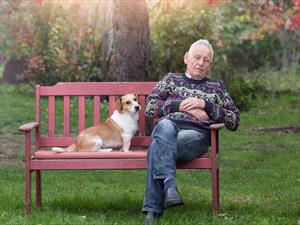Old man and dog on bench

Photo courtesy of Depositphotos
Upon hearing the words animal neglect, many of us think of an emaciated dog chained in a yard without food, water, or shelter. Or perhaps we envision a skinny horse chewing on the rail of a small corral, not a blade of grass or hay in sight, and no other equines for companionship. What we probably don’t think about are instances of animal neglect where the people are in just as bad of shape as their animals, what we sometimes term “self-victimization and animal neglect.”
One way a veterinarian might see this is in our aging clients. As people enter their later years, many of them continue to keep pets. Maybe the animals were left behind by adult children after college. Perhaps the pet was acquired when the folks became empty-nesters. Many people have simply always had pets and that does not change with aging. Whatever the reason for having an animal, sometimes owners are no longer able to care for the pet as they once did. Physical illnesses like arthritis, Parkinson’s disease, or a stroke may present new physical limitations to a person and hamper any ability to take the dog for a walk, trim the cat’s nails, or lift the haybale over the fence. The same client who once took such good care of their pets is no longer up to the task. The veterinarian may first notice changes in the pet’s care, such as being a little less kempt, thinner, or signs of a disease process no longer controlled with medication at home. Then the veterinarian may also notice changes in the owner, such as being a little less kempt, thinner, or signs of a disease process no longer controlled with medication at home. That’s right: the pet and the owner may have similar signs. The owner is no longer able to care well for himself (self-victimization) and also no longer able to care adequately for the pets (neglect, albeit unintentional). In fact, in one study, 92% of adult protective service workers reported seeing self-victimization and animal neglect in the homes they visited.
Sometimes the causes are not so much physical issues but may be more mental or financial ones. Dementia and Alzheimer’s disease, for instance, can cause trouble with remembering routines. Maybe the person no longer routinely takes her medications, much less remembers to give the dog his monthly heartworm preventative or his daily feeding. The death of a spouse, a decline in the economy, or an increase in the cost of living may cause negative changes to an elderly person’s fixed income. Just as some seniors resort to eating less in order to afford the heating bill, so too that person may decrease the amount of medication the pet is receiving in order to save for dog food.
One large group of seniors who routinely suffer from self-victimization in addition to causing neglect to animals are animal hoarders. Oftentimes, animal hoarders are suffering from mental illness. This may result in their living alongside their animals in homes with extreme amounts of filth. The excessive urine, feces, decomposing animal carcasses, and non-biological debris that are often found in these situations can cause high levels of ammonia and aerosolized bacterial, viral, and fungal particles. Respiratory illness and immunosuppression can occur in both the people and the animals. Just the sheer collection of paraphernalia inside these locations can be hazardous for falls or even getting buried alive under avalanches of trash (eight live cats were found in the home of the infamous hoarders the Collyer Brothers, along with approximately 120 tons of debris and junk).
Dog waiting behind gate

Photo courtesy of Depositphotos
When owners bring their pets into the veterinary clinic for whatever reasons, veterinary staff can note how the pet is doing and ask if the owners have any concerns about their ability to care for the pet.
As a society, we can all help both animals and people by keeping our eyes open to friends, family members, and neighbors who may suffer from self-victimization and, subsequently, animal neglect. In our families, we can ask Grandma if she needs help walking the dog or brushing the cat. If Uncle Joe’s horse appears unkempt, gentle questioning as to the cause of the change in care may let us know how we can help. Sometimes neighbors or family can develop a “shared pet” situation in which elderly people enjoy the companionship of pets during the day while younger adults who are often busy at work during the day take over nighttime care, feeding, and medical care.
Keep an eye on such areas as:
- Choose the best pet for the person's abilities to care for it (i.e., not a big dog or one who needs daily walks for someone who uses a walker).
- Understand the pros and cons of specific types of pets; many elderly people do well with a cat because it doesn't need to be walked, whereas those who are mobile enough can take a calm or older dog out for short walks to socialize both the dog and the owner.
- Ask around if there is any financial assistance available in the area for people on a fixed income.
- Have a friend or family member check in or stop by every day to help with such matters as cleaning the litterbox or the bird cage, ensuring the dog has a good walk, brushing the coat, ordering pet food to be delivered on a regular basis.
- Determine if the pet needs to be seen by a veterinarian, make the appointment, and take the pet and owner.
- Decide in advance who will take the pet(s) if/when the elderly person can no longer do so.
In addition to veterinarians helping the pets, elder services may be available to help our seniors. By caring for our neighbors and loved ones, we also care for their animals.
2 Comments
Jennifer Woolf
October 16, 2019
Theresa
September 18, 2019